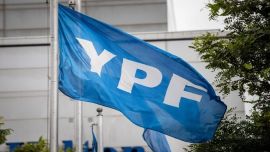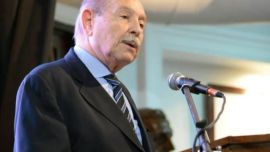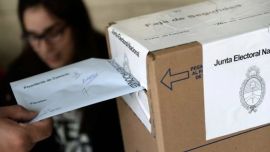The government of Argentine President Javier Milei is hoping that its run of recent political and economic successes will extend to a Manhattan courtroom, as it seeks to overturn a US$16-billion judgment handed down by a United States court against the nation.
Lawyers representing Argentina will on Wednesday present oral arguments in the country’s appeal against a 2023 ruling by a New York federal judge, who awarded former shareholders in oil company YPF SA compensation for losses stemming from its nationalisation more than a decade earlier. For years, the litigation – much like an earlier dispute over Argentina’s sovereign debt – appeared to symbolise the country’s perceived hostility towards foreign investment.
However, former US President Donald Trump’s rapport with Milei – and a resulting US$20-billion credit line from the US Treasury – have improved Argentina’s standing among investors. That backstop, coupled with Washington’s intervention in the local currency market, may have contributed to the sweeping victory for Milei’s party in Argentina’s midterm elections on Sunday.
Those developments are unlikely to sway the judges of the US Second Circuit Court of Appeals, who are hearing the YPF case. Yet they have strengthened Argentina’s hand against the former shareholders, whose claim is financed by litigation funder Burford Capital Ltd. Even if the appellate court upholds the judgment, the plaintiffs may find it difficult to collect. They had hoped to complicate Argentina’s return to international markets to pressure the country into settlement talks, which Buenos Aires has thus far resisted.
“The recent US and Wall Street embrace isn’t good news for Burford,” said Mark Weidemaier, a law professor at the University of North Carolina, Chapel Hill, who specialises in sovereign-debt disputes. Paying a foreign creditor, he noted, would be deeply unpopular domestically.
“If a government is riding high, it won’t have much reason to settle unless the creditor can find a way to disrupt market access,” Weidemaier said.
Investors watching
A spokesperson for Argentina’s government did not immediately respond to a request for comment. Burford referred enquiries to Mike Fragoso, a lawyer representing the ex-shareholders, who said investors were watching Argentina’s behaviour closely and would likely react negatively if the country avoided its obligations.
“The sensible course for the Milei government is to put this matter behind it and move forward in the global economy without the baggage this case has – and will continue to – create,” Fragoso said in a statement.
The legal battle is expected to drag on for months, if not years, and circumstances could change. A victory for the plaintiffs at the Second Circuit could bolster Burford’s position by reminding foreign investors of their long-standing caution towards Argentina. Yet Jared Lou, a portfolio manager on William Blair & Co.’s emerging-markets debt team, believes it would take considerable pressure to bring Buenos Aires to the negotiating table.
“Milei will only do it when he absolutely has to – when there’s a stalemate,” Lou said.
Authorised collection
US District Judge Loretta Preska in New York issued the substantial award two years ago, ruling that Argentina’s 2012 nationalisation of YPF breached the company’s by-laws requiring a tender offer. On appeal, the government intends to argue that the case should never have been heard in a US court.
The Second Circuit is not expected to reach a decision for several months, after which the losing side may petition the US Supreme Court. Preska has already authorised the plaintiffs to begin efforts to collect on the judgment – a process that has triggered a separate legal confrontation.
Weidemaier said Burford’s position is weaker than that of Elliott Management’s Paul Singer, who waged a bruising 15-year legal battle with Argentina following its 2001 sovereign-debt default. Buenos Aires ultimately settled that dispute for US$4.7 billion. Because Singer held Argentine bonds, his claims directly hampered the country’s ability to raise new capital while the case remained unresolved.
Since the YPF dispute is not tied to sovereign debt, Weidemaier noted, it may be more difficult for the ex-shareholders to target Argentine bond issues. However, they have pursued Argentina’s 51-percent stake in YPF, and Preska ruled in June that the Burford-backed plaintiffs were entitled to those shares. The Second Circuit subsequently placed a hold on her order that Argentina hand over the stake, pending a separate appeal.
Handover fight
Julian Ku, an international-law professor at Hofstra University, said Preska’s ruling on the YPF stake shows that the plaintiffs still have cards to play.
“Burford can make life miserable for Argentina, and they’ve got a judge who’s motivated to execute the order,” said Ku. “I wouldn’t want to tangle with that.”
Weidemaier called Preska’s handover order the plaintiffs’ “big hammer” at this stage.
Both the Trump and Biden administrations have supported Argentina’s stance on the shares issue. In November 2024, the US Justice Department reiterated in a court filing its “long-standing position that foreign sovereign property located abroad is not subject to execution in US courts.”
The Biden administration warned that allowing the plaintiffs to seize Argentina’s shares could prompt foreign courts to target US assets in retaliation.
Aside from those shares, Weidemaier noted that the plaintiffs have “only a small subset of assets from which to collect” – a predicament similar to that faced by Singer when attempting to enforce his judgments.
Ku added that Trump’s friendship with Milei could, paradoxically, aid the plaintiffs.
“It could be a Trump-style deal – Argentina settles the case, and the US ensures American investors are protected,” Ku said. “It could even have a happy ending.”
related news
by Jonathan Gilbert & Bob Van Voris, Bloomberg




















Comments